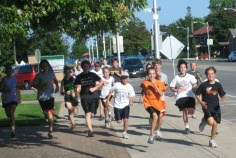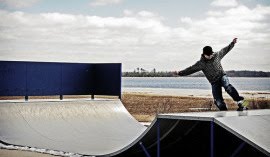Can Running Solve Homelessness?
Wednesday, October 22, 2008
 Engaging and Developing Future Leaders through the Inclusive Sport of Running
Engaging and Developing Future Leaders through the Inclusive Sport of Running
By Bobbie Stacey - Founder of Home Run Innovations Inc.
The middle school youth in the photo above are celebrating their joint victory (boys and girls) at the Central Upper Peninsula Middle School Cross Country finals. As one of their coaches, I can tell you that the children grew to love each other's company and looked forward to practices and meets. The positive social aspects of the X-Country program amazed me. By the end of the season, it would not have mattered what we asked them to do, as long as they could do it together. They are begging me to begin the winter running club I suggested during our awards dinner.
Those are happy kids in that photo. They are each pleased with their individual progress from the start of the season and proud of their team accomplishments. They are better friends to one another than before the season began. Virtually all have said they will return next year. I know that I am proud of them. I know how far each of them has come. I have never in my life been so awe-struck by the unlimited potential of youth. That's no longer a cliche´ in my mind.
Could these young runners be the seeds of a new, socially responsible generation? Will they embrace causes as a group, such as homelessness, and run together to solve them? Will they expand their collective running experience to the world at large, becoming stronger individuals in the process? Will their peers from other communities do the same? I'm betting YES - if only we'd ask them.
Let's ask them, shall we?

Home Run Events: Innovative Ideas for Community Revitalization by Roberta (Bobbie) Stacey is licensed under a Creative Commons Attribution-Noncommercial-No Derivative Works 3.0 United States License
Running solving homelessness? Come on. How can sweating on streets, treadmills and trails, mile after mile, put roofs over peoples heads? Isn't running a time consuming personal pursuit for self-absorbed, obsessive fitness nuts? Wouldn't we be better off if all those running hours were collectively poured into volunteer home building?
Read on and decide for yourself.
First of all, let's back up and examine the popularity of running as an activity in the United States. According to Running USA's Road Running Information Center (RRIC), in 2007 there were 8,875,000 road race finishers in the United States, a 4.2 percent increase over the previous year with a 50-50 split between males and females. By comparison, according to RRIC data, there were just over 3.7 million U.S. road race finishers in 1987 - quite a leap for one decade. It is also estimated that in 2007 there were somewhere between 11 million and 16 million frequent (Run/Jog 100+ days/yr) runners, depending upon the studies cited, approximately 40 million U.S. residents claim to have run or jogged at least once during the year.
Next, examine the money raised for charity through road race events Road runners and walkers raised $714 million for charity in 2006, according to USA Track & Field (USATF). Dividing that dollar amount by 8,535,000, the number of road racers in the same year, comes out to an average of $83.66 per event finisher. Hmmmm, healthy aerobic activity and assistance for charitable causes. OK, maybe running isn't such a self-absorbed activity.
What about youth? Who among us has not observed an epidemic of obesity among the current generation of U.S. children along with several health problems that follow? The same RRIC report cited above also includes a whole section of youth running statistics and verifies the increasing popularity of youth running programs.
The middle school youth in the photo above are celebrating their joint victory (boys and girls) at the Central Upper Peninsula Middle School Cross Country finals. As one of their coaches, I can tell you that the children grew to love each other's company and looked forward to practices and meets. The positive social aspects of the X-Country program amazed me. By the end of the season, it would not have mattered what we asked them to do, as long as they could do it together. They are begging me to begin the winter running club I suggested during our awards dinner.
Interestingly enough the positive social rewards of running are almost as important to adults. The RRIC reports also show that while weight control is by far the number one reason that adults start running, at least 50 percent of runners continue to run because of the social aspects - the sense of belonging to a larger community with common interests.
It isn't that children don't want to run and be more active. The problem, as I see it, is that the parents can no longer imagine why their child would want to run. So parents don't suggest it or seek running program options for them.
Granted, telling your child to go and do something that you are not willing or able to do yourself doesn't cut it. At least it sure doesn't work with my children. However, I respect that there are legitimate reasons why some parents are unable to take up running with their kids - besides an aversion to exercise. During the time that I competed in high school sports, it would have been very easy to acquire a sports injury from overuse or lack of cross-training and subsequently receive medical "treatment" for it that even made the problem worse. These were the days before laser surgery techniques, Title IX, physical therapy - and even running shoes became ubiquitous in our lives. Besides, there are other active pursuits that can produce the same positive results. My family just happens to have a bias for running.
Granted, telling your child to go and do something that you are not willing or able to do yourself doesn't cut it. At least it sure doesn't work with my children. However, I respect that there are legitimate reasons why some parents are unable to take up running with their kids - besides an aversion to exercise. During the time that I competed in high school sports, it would have been very easy to acquire a sports injury from overuse or lack of cross-training and subsequently receive medical "treatment" for it that even made the problem worse. These were the days before laser surgery techniques, Title IX, physical therapy - and even running shoes became ubiquitous in our lives. Besides, there are other active pursuits that can produce the same positive results. My family just happens to have a bias for running.
Today as coaches - we all run with our team at each and every practice. It's an amazingly simple concept. We make a commitment to hang out with a bunch of fourth through eighth graders for an hour, three to four times per week and for approximately eight Saturday mornings during the fall season. We gather the kids, stretch them out, tell them where and how far they are running that day. Then we run. Afterward we gather back together for more stretching and exercise and often a group game that improves their agility, footwork or speed. No equipment is required other than appropriate medium-price running shoes and a pair of shorts and t-shirt. Most importantly, all children of any abilities and from any background are welcome.
Those are happy kids in that photo. They are each pleased with their individual progress from the start of the season and proud of their team accomplishments. They are better friends to one another than before the season began. Virtually all have said they will return next year. I know that I am proud of them. I know how far each of them has come. I have never in my life been so awe-struck by the unlimited potential of youth. That's no longer a cliche´ in my mind.
Could these young runners be the seeds of a new, socially responsible generation? Will they embrace causes as a group, such as homelessness, and run together to solve them? Will they expand their collective running experience to the world at large, becoming stronger individuals in the process? Will their peers from other communities do the same? I'm betting YES - if only we'd ask them.
Let's ask them, shall we?

Home Run Events: Innovative Ideas for Community Revitalization by Roberta (Bobbie) Stacey is licensed under a Creative Commons Attribution-Noncommercial-No Derivative Works 3.0 United States License








0 comments:
Post a Comment